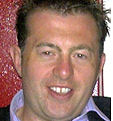It seems a bit strange to be reviewing a book first published nearly 25 years ago but Rough Ride definitely deserves a wider audience and it particularly relevant given the debate about doping in pro cycling today.
Rough Ride is the tale of Paul Kimmage's career in the pro peloton and his life as a domestique in both the Tour de France and the Giro, the Classics as well as numerous less glamorous races across Europe.
It tells of Kimmage's youth as an amateur in Ireland before turning pro after finishing sixth in the World Championship. He rode first for RMO and then Fagor, never with outstanding personal success but often as the man who set up victories for his team-mates. It is unusually frank for a cycling book and is also unusual in that Kimmage – who is now a successful journalist – wrote it himself while most pro cyclist's autobiographies are ghost written.
The frankness of the book can be seen in two distinct parts. First it tells us just how tough and unrewarding life as a pro cyclist can be. Make no mistake, if you are not team leader then much of one's life is drudgery and misery. There are rare highs punctuated with plenty of lows. Family life is hard to sustain and there is the constant worry about contract renewal at the end of each season.
The second is that Kimmage is utterly frank about doping in cycling and the extent to which it was both accepted as part of the sport and covered up by everyone involved in. It is a relatively small part of the book – a chapter called “Spitting in the Soup” (which comes from the French term 'crache dans la soupe' which is what the peloton refers to people who break the code of omerta among riders) addresses the issue and is 10 pages of a 261 page book – but it is devastating in terms of both describing why riders dope, how it is accepted and why something needs to be done about it.
Kimmage was not proud of his doping – and what he did was fairly obviously minor stuff involving amphetamines by comparison with some of the blood doping the top names must have been involed in – and the book is very powerful for the anger and shame that he displays at having had to dope in order to be able to compete on something akin to a level playing field.
Reading his book so soon after Lance Armstrong was nailed, it is hard to believe that so many people thought cycling was clean for as long as they did. Rough Ride was never published in French but it won the William Hill Sports Book of the Year in 1990 and it describes exactly the same culture of the peloton that Tyler Hamilton's The Secret Race covered in 2012.
Read in conjunction with the Lance Armstrong case, Tyler Hamilton, the various drugs investigations across Europe and everything else, it is hard to believe that any major race winner in the past 30 years was entirely clean and that those who chose not to dope essentially were competing on a different, lower tier. Perhaps there were a small number of exceptions where an incredible rider on his day could win one of the Classics but personally I would not trust the results of any of the stage races.
Even without Kimmage's drug revelations, Rough Ride deserves to be among the classics of cycling literature. It is beautifully written, searingly honest and as relevant today as when it was first written.
Rough Ride
Yellow Jersey Press
Originally published: 1990
0 Comments





